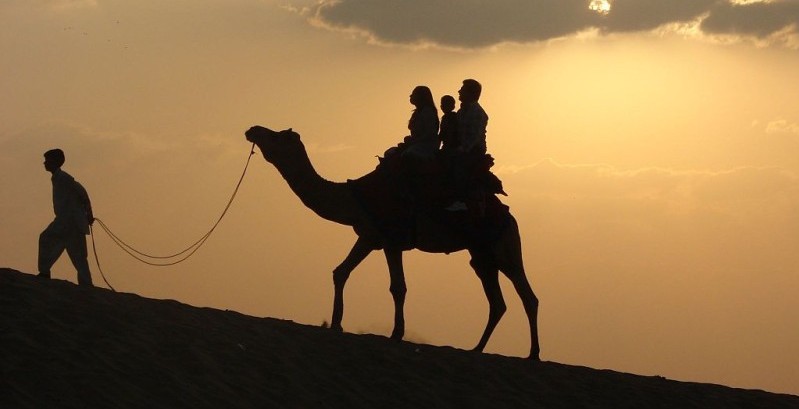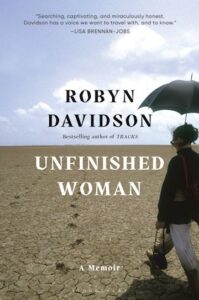
After Australia: Robyn Davidson on Discovering Her Next Adventure
“Perhaps a strong fate is nothing more than a reckless disregard for consequences.”
Featured image: Sam Dunes near Jaisalmer, camel in Rajasthan by Coolgama under Creative Commons 4.0 International
I was twenty-seven when I walked across Australia, with a dog for company, and camels to carry my gear. It was a deeply private act, which I assumed would hold no interest for others. I had no intention of writing about it afterwards, nor of recording the journey as it was happening. It was the doing of something just for itself.
Yet so personal a gesture—a wish to disappear beneath any radar—would beget its opposite. Before the journey was even over, I was front-page news, and later the story was repeated on the covers of hundreds of magazines around the world. Rick Smolan’s gorgeous photographs lent a glamour to what I had done, to which I had been oblivious while doing it.
Of course that doing changed me. It gave me what I had known, inchoately, I needed—a kind of integration. Proof to myself that “useless ugly stupid” was not all there was. But it did much more than that. It rerouted my fate and recast my prospects, an upheaval all the more disorienting for being unexpected. And it would affect others, intimates as well as strangers, in ways that were baffling to me at the time.
I knew I would need to explore other kinds of mobile cultures to see if my hunches had any value at all.
Here were different kinds of danger, requiring a different kind of prudence. Fame, that grand deluder, puts you at risk of ceasing to be yourself. It distorts not just how you appear to others, which doesn’t matter much, but how you might appear to yourself, which does. I knew this instinctively, and my response was to retreat from it. I feared the loss of anonymity and privacy, and with it a particular kind of freedom: to observe rather than be observed. When retreat was not possible, I made a facsimile Robyn, a public identity to protect the private one.
All of which isn’t to say that I eschewed the benefits suddenly bestowed—an enormous opening of opportunity. I had lost something but, at the same time, was being offered so very much. Negotiating those assets and liabilities, while protecting an internal space free from distorting influence—that was the task. I certainly had no sophistication to guide me, only an innate discernment that had directed my course so far.
The most important asset was that at last I had what I once feared would be forever beyond my reach: money for plane fares out of Australia. (Can anyone today understand how urgent that desire was for my generation, and how difficult to assuage?) There were even possibilities waiting on the far side. Jonathan Cape Publishers in London had offered to pay me an advance to write a book.
But did I want to write a book? Who said I could write a book? I enjoyed writing for myself, and the article I had to produce for National Geographic was easy, because it was facile. I wrote a longer one for the London Sunday Times, and that had given me satisfaction. But a book? On the pro side, I reasoned that, if I did write it, the limelight would shift to the book, and I would be left alone. The way you might distract a pack of dogs with a thrown bone.
I was reading Doris Lessing at that time and, like so many others, had been bowled over by what she had attempted in her novels. Until then I had more or less avoided female authors. I already knew how women thought, how they saw and experienced the world. What I needed to know was how men thought. They were the inheritors of the enlightenment project to which I aspired. They ran everything, they were the powerful, and to understand them was to understand the world, the better to negotiate a place in it. Doris’s writing spoke directly to the complexities of finding that place. Again it must be understood that at that time there were very few models for unconventional women to be inspired by. There was the sense that we had to make it up as we went along, out there on the front lines, without much to guide or encourage us.
I wrote to her and said how “useful” her work had been to me. She replied. We corresponded. In response to my hesitation in committing myself to Jonathan Cape, she said, “If you can write a good letter you can write a good book. Why don’t you come to England, since your publishers are here?”
So I did.
Via a stop-off in India, courtesy of dear Rick, who took me along as a sidekick on a photographic assignment.
There were many countries I wanted to explore, but India had never been one of them. The patchouli and incense; the hepatitis and credulous spiritualism coming back along the hippie trail only confirmed my bias against it. India was not for me.
Rick had to cover the Pushkar camel fair, in Rajasthan. The festival is now famous, and many Europeans go there. But at that time, 1978 (or perhaps it was 1979), I think he and I were the only non-Indians present.
This was one of those moments when I stepped into the unknown, unburdened by nous or knowledge.
Another profound effect of the desert journey was that it informed a new way of looking at human history. Because I had begun to know a little about Australian Aboriginal culture, through an association with Eddie, an old Pitjantjatjara man who had decided to accompany me part of the way, I was able to compare hunter-gatherer ways of being with the cultural assumptions inherited from millennia of agriculture. I had been struck by how profoundly at home, existentially at home, he was. His ancestors had solved so many of the problems inherent in human existence. Goods were shared out pretty much equally, no one was left out. They were environmental scientists par excellence. And the philosophy of the Dreaming, in so far as I could penetrate it, seemed to me one of the greatest ever brought forth from human imagination: a theory of everything rendered into poetry.
Nomads, generally speaking, tread lightly upon the earth. Because they are constantly moving, they cannot accumulate a lot of stuff. They have to know their environments well, valuing and accumulating knowledge systems rather than goods. Agriculture, on the other hand, in its battle with nature, has created problems for us that have escalated until our species threatens its own existence. These were nascent ideas at the time, and they were certainly not free of romanticism (the desire to escape reality rather than apprehend it better). Even so, they were working away at the back of my mind, and I knew I would need to explore other kinds of mobile cultures to see if my hunches had any value at all.
India was about the last place I imagined stumbling across that opportunity.
The Raika Rabaris were Rajasthani camel herders, and they had come to Pushkar to buy and sell their animals. Never could I have imagined, in my most starry-eyed fantasies, that nomads could look like this. The women wore bright pink chiffon veils bordered and embroidered with silver. Voluminously gathered skirts like mid-length tutus. Huge silver bangles on their ankles. Stack upon stack of bracelets up their muscular arms. The men were all in white, with huge scarlet turbans. In the dusk, they camped on the pink sandhills surrounding Pushkar, with their tethered camels, sitting around tiny fires, the women’s silver reflecting spangles into the smoky air.
What if I could travel with them?
So it was that, after Rick had returned to the States, I found myself standing alone on an empty airport runway, in the middle, from my point of view, of nowhere, wondering how I might go about locating a gentleman called Gomal Khotari. Someone in Delhi had told me he knew all there was to know about the Rabari.
I seem to have had an unusually fateful life, not in the supernatural sense, but more mundanely, in this way: odd and unlikely events, coincidences, have produced enormous effects, fanning out into future time, and seemingly outside my control. Perhaps a strong fate is nothing more than a reckless disregard for consequences, which can look like courage, but is really something else—a curiosity greater, even, than fear. Or even more banal, a difficulty in saying no. In any case, this was one of those moments when I stepped into the unknown, unburdened by nous or knowledge, and stumbled across my future.
__________________________________

From Unfinished Woman: A Memoir by Robyn Davidson. Available from Bloomsbury Publishing. Copyright © Robyn Davidson, 2023. All rights reserved.
Robyn Davidson
Robyn Davidson was born on a cattle property in Queensland. She moved to Sydney in the late Sixties, then returned to study in Brisbane before going to Alice Springs to prepare for her journey across the Australian desert. Davidson’s first book Tracks, her account of this crossing, was an international sensation, and was adapted for a film starring Mia Wasikowska and Adam Driver. She has travelled extensively, and has lived in London, New York and India. In the early 1990s Davidson migrated with and wrote about nomads in north-west India. She is now based in regional Victoria, but spends some time each year in India.



















